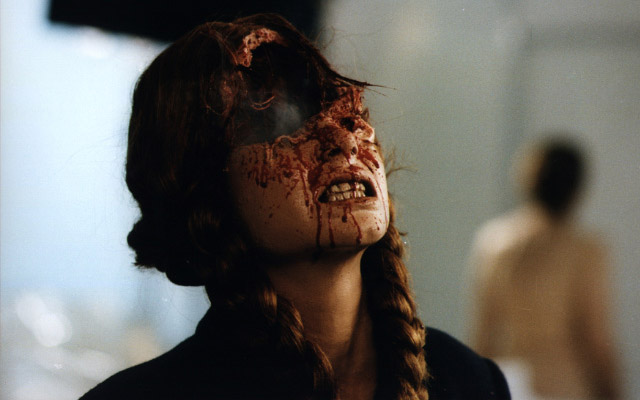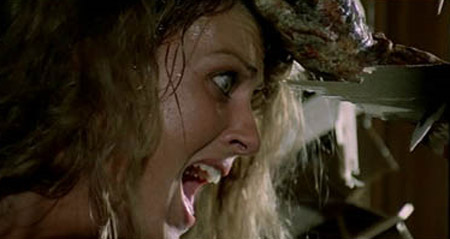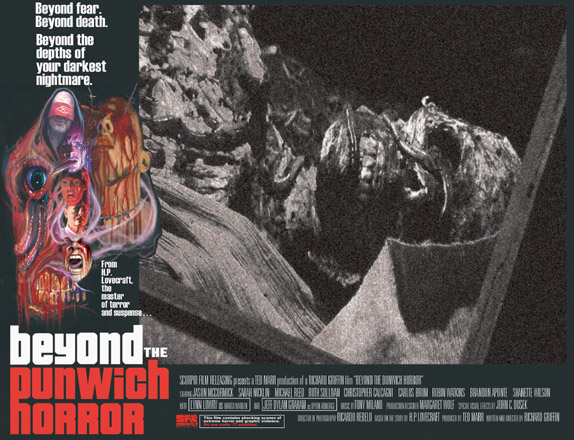
Fulci Lives!
THE BEYOND
Starring Catriona MacColl, David Warbeck, Al Cliver
Directed by Lucio Fulci
Grindhouse Releasing
It seems that, since just about everyone in the world of horror is so well aware of "The Beyond", and, even more appropriately for me, everyone in the world of horror has already written their own opinions about it, that to add mine just seems, well, totally redundant. You might as well title this “Not Another 'The Beyond' Review”.
Keeping that in mind and having just watch Grindhouse Releasing's reissue, once again it strikes me just how -- I need to capitalize this -- TOTALLY FUCKING SCARY this movie actually is. I am a thirty year old man and it's one in the morning and I wish I could go sleep in my parents' bed. With the hall light on. With the night-lite on. With a gun, just in case.
Go ahead and laugh. I know that I'm supposed to be jaded and I know that, for most people, there's been scarier stuff released before and since, but, you know, serial killers and slashers and the like have never scared me. No -- it's Hell that scares me. A Hell on earth; demons breaking through to our world, slaughtering us on an unholy rampage. Maybe it's the Catholic in me, but Satan, Hell, whatever, is really the only thing in film that truly terrifies me.
But you just can't throw the Devil on the screen and expect me to be scared, otherwise "The Devil and Max Devlin" would have made me urinate in my shorts... Again. No, a truly scary, truly demonic film needs to have an aura, an atmosphere of evil, a sense of unholy dread surrounding it to accomplish that. An otherworldly feel that has ideas and sequences that give off the impression that you are watching something wholly diabolical on-screen, something that wasn't meant for human eyes. A feeling of ominousness and pure fear that shadows the room when you watch it, causing you to turn the lights on half-way through and jump at any sound your house might make.
"The Beyond" is such a film. This is not some Italian cheese-fest; this isn't a Spaghetti joke. The images that Fulci puts on screen are nightmares - and I'm not talking about the gore. Gore is nothing special. It's the lovingly perverse way that he uses that gore, expelling all hope for the characters embroiled in it, that makes it all work. "The Beyond" is an extraordinarily hopeless film. It's a film that takes place in a world without God's mercy. It's a world that has forgotten God, allowing Hell to encroach and take root.
This loneliness from God and his salvation is pounded home in the final image (editor's note: spoiler alert!) when our main characters are left alone in a barren eternal wasteland, that I think is supposed to be Hell. It's the most shocking scene in the film and it doesn't have a drop of blood in it. It's the ultimate downer ending: the good guys have not only lost the battle but their souls as well and, because of their failure, have allowed Hell to claim the Earth. Cue credits.
I think the thing that really scares me is the way that Fulci, before I had even seen this film, had accurately captured many images from my own nightmares. The desolate road with water on both sides and no land on the horizon; the way that even though there's light outside the inside of the house is very dark; eyes with no pigment; and a Hell that isn't made up of flame, but dust. Are these common dream images? I've had these images in my head for as long as I can remember; I dreamed them when I was as young as five. To me, this makes the film all the more foreboding.
This is part of Fulci's “Gates of Hell” trilogy, which included "The House By The Cemetery" and "City of the Living Dead". All three are so totally different than anything Fulci had really done, filled with such a sacrilegious fervor that you get the feeling that something must have had possessed him to create this trilogy, these pitch-perfect visions of Hell so perfectly. Were these the films of a demonic madman with a warning, or merely a vessel of dark visions, like say, a Hieronymus Bosch woodcut put to celluloid?
Or, even worse, was it just the work of a guy trying to collect a paycheck?

PAURA: LUCIO FULCI REMEMBERED VOLUME 1
Documentary
Directed by Mike Baronas
Paura Productions/Tempe
What better way to learn about the man that is Lucio Fulci than through the people that knew him and worked with him? Well, I guess I could go and ask him, but, sadly, he's dead so unless I want to pay those outrageous spiritual medium fees, the words of the living willl have to do.
And what a collection of words it is! Broken down into “Victims”, “Accomplices” and “Peers”, Mike Baronas' ultra-exhaustive (the first volume!) collection of interviews delves deep into Fulci's psyche through anecdotes and thoughts. Carlo Rambaldi says he was a “happy guy” but only acted like a jerk to get the best out of his crew, but actress Carla Cassola says that his on-set “vulgarness” (her words), came from his intense fragility. When hearing so many conflicting psychoanalysis like these, you get the feeling maybe even his closest friends didn't know who he really was, making the man even more interesting, and making me even more perplexed.
But the one thing that everyone's recollections have in common is that while he was a genius technician, director and storyteller, Italian cinema had completely screwed him over, forgetting him and throwing him in the trash. (Well, that and the fact he needed to take a shower - he was apparently not very hygienic.) Even worse, his later years were especially sad, as the once totalitarian director had been reduced to a sad, bitter man, having his projects like "Zombi 3" taken away from him. And then, to make the whole thing even sadder, there's his personal life of misery, from the suicide of his wife to his debilitating diabetes, which ended his life way too early for him to see just how influential he had become in America.
The format of this doc may irritate certain fans; Baronas just lines up the interviews, allowing the participants to talk at length without interruption. I actually found the approach extremely refreshing. I already know about his films, so I don't need a refresher course. Just tell me the behind the scenes anecdotes and, best of all, what you felt about the man. This is why "Paura" works so well.
The only problem with the whole thing -- and this is not a problem for me, by the way, but for, let's say, the “casual viewer” -- is that this is only for the most hardcore of all Fulci fans. It's literally like a fanzine put on video. (Which reminds me: most of the interviews are in Italian, so reading is required. Illiterates beware!) It's for people who want to get to know Fulci the man and his personal interactions. I'd imagine the marketplace for people interested in this is quite the shallow pool, but, the water is nice and warm and filled with chunks of brain. Bring on volume two!

BEYOND THE DUNWICH HORROR
Starring Jason McCormick, Sarah Nicklin, Michael Reed
Directed by Richard Griffin
Scorpio Film Releasing
There's a saying that the works of HP Lovecraft are practically unfilmable. Sorry to be a plebeian, but I personally find him unreadable. I like his ideas and when people synopsize them to me, I get really interested -- but to actually sit down and read one of his tomes, it's just too daunting for me. Proust is easier to digest!
That's why I appreciate filmmakers who take it upon themselves to adapt and film a Lovecraft work. It saves me all that reading time and I'm always entertained. One of my favorite filmmakers as of late, Richard Griffin -- he of "Feeding the Masses" and "Splatter Disco" fame -- has taken up the torch and brought to life a modern-retelling of “The Dunwich Horror” (at least I think it's a retelling; I've never read the original story, natch), with horrifically disturbing visuals, disjointed acting and incredibly accurate music, all by way of Lucio Fulci. No one has ever really captured that Fulci spirit the way Griffin has, making "Beyond..." a must-watch for Fulci-fans.
When Kenny's brother is committed to an asylum in the titular town of Dunwich, he hooks up with a reporter and together they investigate the bizarre murders plaguing the town and how they are tied to a pair of local rich sleazes named Nikki and Otto. Instead of unwrapping this mystery in a linear fashion, "Dunwich" weaves in and out of storylines and timelines, making the otherworldly jarring movie all the more wonderfully maddening. The final scenes, when we learn just who and what is behind the disappearances, are especially nightmarish, leaving you with a weird, unsettling feeling that you just can't kick. Just like Fulci.
"Beyond the Dunwich Horror" is very much the type of flick Fulci would make today, with every frame getting more and more bizarre and surreal, spewing a real Euro-sleaze coating over everything it touches, from the ludicrously-delivered dialog to the bleak, hopeless ending that gives the original "The Beyond" a run for its Satanic money.
In the end, we'll probably never know what made Fulci tick. We'll probably never know what was going on in his head to make his celluloid nightmares so potent. But, maybe the more we use them to interpret our own fears, the closer we'll get to an answer. Either way, get your ass to church!

